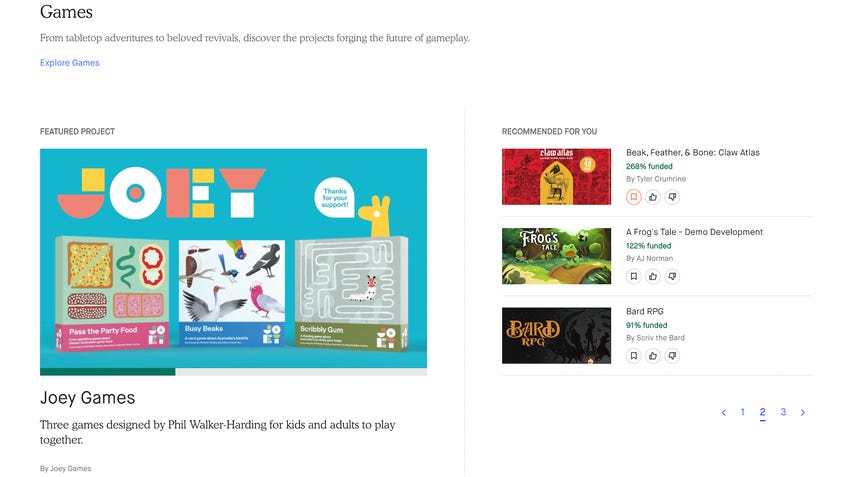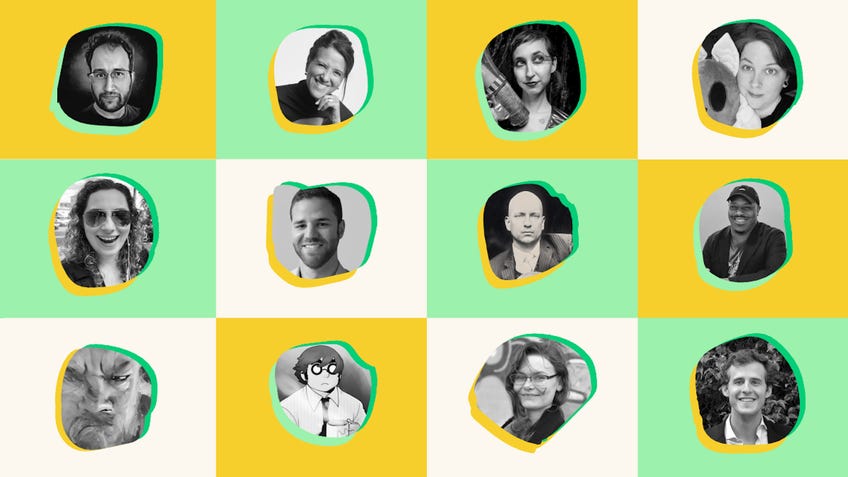More indie support, less blockchain: Kickstarter’s new games advisors on tackling the crowdfunding giant’s problems
Munchkin maker CEO and Stray Fawn Studio co-founder discuss the hopes and goals they want to bring to the popular platform’s attention.
On June 14th, crowdfunding giant Kickstarter announced the names of 12 people selected to represent creators and backers as part of the first Community Advisory Council. The company claimed the council would better help those in charge hear the concerns of both backers and creators.
Less publicised was Kickstarter initially positioning the council’s creation as balm on the rash of public outcry sparked by its insistence that funds and time be dedicated to researching blockchain technology. The members would ostensibly check the worst instincts of those leading the still-vague project, reminding them not to lean too heavily into the infrastructure powering such winning ideas as NFTs, cryptocurrency and other financially wispy, ecologically devastating Web3 pipedreams.
It’s fair to say the council has its work cut out, but at least two of the members most directly related to games expressed a healthy optimism and clear-headedness in interviews with Dicebreaker. Philip Reed, CEO of Munchkin creator Steve Jackson Games, and Philomena Schwab, co-founder of video game developer Stray Fawn Studio, are preparing for the first meeting on June 29th by focusing on much more than the blockchain.
A Kickstarter spokesperson told Dicebreaker that summarised notes of each council meeting will be published afterward and that they would note when a recommendation from council members factored into a decision. Additionally, members will be able to publicly discuss what goes on inside meetings, if they wish.
Reed and Schwab both pinpointed the need for better backer survey tools, the forms creators send to backers when fulfilling projects, along with the ability to edit campaigns and have more control over how conversations happen in a project's comment section. Much of this has been handled already by third-party companies such as Backerkit, who very recently announced itself as a direct crowdfunding competitor to Kickstarter. Schwab expects the council will raise the spectre of alternative platforms, eventually.
Another prescient concern is whether they can convince Kickstarter to pay more attention to projects that don’t set goals in the millions of dollars. Games - especially tabletop games - have regularly broken records for campaign funding over the last two years, and many smaller creators have begun to feel forgotten in the shadow of an ever-growing pile of money and expectations.

Reed believes the platform wants to do better by this portion of its audience. “They’ve made it clear to me over the last couple of years that while the really big projects are where the money’s at, the tiny projects are the ones they try to help wherever possible,” he said. “I know for a fact that the people I’ve talked to [at Kickstarter] love seeing the new, kind of quirky, different indie creators doing projects.”
Reed said Kickstarter may not have the staff to do everything they want (Dicebreaker has reached out to Kickstarter to confirm) and that a focus on site-wide events would do much to promote often-ignored projects. One example would be to extend the annual Zinequest event - currently focused on indie TRPG creators - into a site-wide initiative, tying in music artists, filmmakers and other creatives as an effort to cross-pollinate sections of its massive user base. Another possibility is broadening the kinds of campaigns to include open-ended projects, a la Itch.io's slower-paced Itchfunding, or even 24-hour ‘blitzfunding’ experiments.
“I want to see the site used not to make more of what we already got but to create completely new and different things,” Reed said. “Too much of the crowdfunding ecosystem is wrapped up in how fast you can fund, how many stretch goals you unlocked. Everyone loses sight of the projects that almost made it to their humble $20,000 goal in 30 days and just needed a little more time.”
Schwab leaned on her experience in video games, comparing Kickstarter to longrunning digital storefront Steam. By allowing creators to tag their projects with categories that users could follow, Kickstarter might better recommend upcoming or ongoing projects relevant to their interests. She admitted that Steam is a double-edged sword - its ubiquity means developers have to acquiesce to shifting algorithms in an effort to best gain exposure in an ecosystem where nearly 1,000 new games can be added per month (2021 saw over 11,000 new titles, alone).
At the end of the day, Schwab wants creators to have as many tools as possible at their disposal and not have to focus on advertising to the detriment of the actual game. “It’s Kickstarter’s responsibility to curate and surface smaller projects,” she said. “I went into [the council] with the confidence that they will listen because I believe they want to do the best for their users.”
The stalwart optimism she displayed in conversation flagged slightly when discussing “the elephant in the room”: Kickstarter’s blockchain plans. Schwab admitted she had avoided the subject as much as possible, and it hadn’t factored into her decision to join the advisory council. Now, though, she feels an obligation to learn as much as possible.
“Even if it was a good next step, it’s not worth angering your community and users,” she said. “Unless I’m hearing an incredible reason, I'd recommend to freeze the project until there’s more public belief that this tech will actually solve a problem.”

Reed agrees. “I'm not gonna pull up with torches and pitchforks until I understand what they are trying to say. And honestly, I do not understand the answers,” he said. ““The fact that they haven’t said anything in three months makes me hope it's a non-starter.”
Schwab expressed confusion over Kickstarter’s messaging since first announcing the plan in December of 2021. She said the timing of their eventual responses did not instil confidence, and the content wasn’t as clear as one would hope, given the public backlash. She expects the council, by comparison, will give the public a fairly direct advocate inside a company that, to many, seems extremely distant from their concerns.
Schwab said she will be spending the weeks leading up to June 29th’s council meeting speaking with blockchain experts and attempting to understand the company’s logic. “I have quite the responsibility to bring the voice of my peers to the ear of Kickstarter,” she said.


